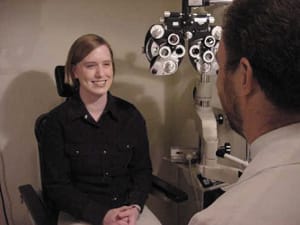contact lens practice pearls
How You Ask is as Important
As What You Ask
BY THOMAS G. QUINN, OD, MS, FAAO
How ya doin'?" seems to be the ubiquitous question of the new millennium. From beer commercials to day-to-day greetings, this phrase pours forth repeatedly nearly everywhere. But can it serve us in the confines of the contact lens examination room?
An Early Learning Experience
Around 1982, at The Ohio State University Optometry Contact Lens Clinic, a perplexed student shuffled into my office stating, "I've a patient who is back for the fourth time and is still experiencing discomfort with her left contact lens." We'd fit the patient with GP contact lenses, and she achieved excellent vision and all-day wear. However, after edge polishing and multiple design changes, the comfort issue with the left lens persisted.
I approached the patient and inquired, "Is that left lens giving you problems?"
She responded, "The student asked me if I was more aware of one lens than the other, and I told him yes. I can feel the left lens more -- but it doesn't really bother me."
That answer made it clear that we'd invested weeks of effort into trying to solve a contact lens problem that didn't exist. I learned a valuable lesson from that experience -- how you ask a patient a question is as important as what you ask.
|
|
|
|
Figure 1. Asking open-ended
questions during a patient interview will help you determine how patients really wear and care for their lenses. |
|
Broadening the Scope
Asking broader questions such as, "How are you getting along with your contact lenses?" or, for a more positive slant, "How are you enjoying your new contact lenses?" has a greater likelihood of eliciting desired information about any problems the patient may be experiencing.
Open-ended questions such as these give patients the freedom to direct the focus of the discussion to their area(s) of concern -- the relevant issues. Streamlining your care by using this approach is invaluable in today's healthcare time crunch in which we unfortunately don't have as much time as we'd like to spend with each individual patient.
Exploring Lens Treatment
In a further effort to maximize efficiency, you may find yourself tempted to ask questions such as, "Are you replacing your contact lenses every two weeks?" and "Do you clean your contact lenses nightly?" This "put-the-words-in-the-patient's-mouth" approach often tempts the patient to take the path of least resistance and simply answer in the affirmative.
You're more likely to get the real story of how patients are wearing and caring for their lenses if you use the broad question approach and ask, "How often do you replace your contact lenses?" and "How are you caring for your contact lenses?"
Assessing Specialty Lenses
Open-ended questions are particularly valuable when assessing patients' responses to specialty contact lens designs, such as multifocals. Objective data, such as visual acuity measurements, can help you, but it often doesn't provide the whole story.
It tells us how patients respond to a high contrast target in an exam room. What we really want to know is how patients are performing visually during their daily activities in their customary environment. General questions such as, "How ya' doin'... with your contact lenses?" may be just the right query to find out.
Dr. Quinn is in group practice in Athens, Ohio, and has served as a faculty member at The Ohio State University College of Optometry.




